Premium Only Content
![Aldous Huxley Interview From 1958 [Predicting Dystopian Future and More]](https://1a-1791.com/video/fww1/95/s8/1/l/7/k/P/l7kPy.-Q4e-small-Aldous-Huxley-Interview-Fro.jpg)
Aldous Huxley Interview From 1958 [Predicting Dystopian Future and More]
The key points from the 1958 Aldous Huxley interview with Mike Wallace:
1. Vision of a Dystopian Future: Huxley, author of *Brave New World*, warns that the dystopian world he depicted is approaching, driven by impersonal forces and technological devices that threaten freedom.
2. Enemies of Freedom: Huxley identifies no deliberate sinister individuals but highlights impersonal forces reducing freedom:
- Overpopulation: Rapid population growth, doubling every half-century, strains resources, particularly in underdeveloped countries, leading to economic instability and increased government control, potentially fostering totalitarian regimes.
- Over-organization: Advancing technology necessitates complex, hierarchical organizations, reducing individuals to subordinates under bureaucratic control (big business or government).
3. Technological Threats: Technologies, morally neutral, can be misused to control populations:
- Propaganda: Huxley cites Hitler’s effective use of radio and other devices, warning that modern methods (e.g., television) could be more powerful if misused, especially in totalitarian states where media pushes a single narrative.
- Drugs: In *Brave New World*, Huxley imagined "soma," a drug controlling emotions and behavior. He notes the emerging pharmacological revolution, with mind-altering drugs that could manipulate mental states without severe physiological harm.
4. Totalitarianism Without Terror: Unlike Orwell’s *1984*, which envisioned dictatorships based on violence, Huxley predicts future regimes will secure power by gaining consent through drugs, propaganda, and bypassing rational thought, making people “love their slavery.”
5. Risks to Democracy: In the U.S., Huxley sees threats from advertising and political campaigns that prioritize personality over policy, merchandising candidates like products. Techniques like subliminal projection could manipulate voters unconsciously, undermining rational democratic choice.
6. Impact on Children: Children, highly suggestible, are targeted by advertising (e.g., singing beer commercials), which could translate into ideological manipulation in a dictatorship, creating “loyal ideology buyers.”
7. Education and Vigilance: To counter these threats, Huxley emphasizes education to uphold individual values, critical thinking to resist manipulative propaganda, and awareness of technological misuse. He advocates for “eternal vigilance” to preserve freedom.
8. Decentralization: Huxley supports decentralizing power to smaller units, as Jefferson suggested, to empower voters and counter the impotence felt in large electorates. While some industries (e.g., textiles) can decentralize, others (e.g., automobiles) require centralization.
9. Freedom’s Necessity: Huxley believes freedom is essential for a truly creative and productive society, though authoritarian regimes like Soviet Russia can achieve technological progress by granting limited freedom to an elite (e.g., scientists) while restricting the masses.
10. Soviet Example: Huxley notes that Soviet Russia, despite its lack of freedom, supports creativity among select groups (e.g., scientists) with privileges, suggesting a model where an oligarchy enjoys freedom while controlling a subdued population.
11. Urgent Warning: Huxley stresses the need to anticipate and address these threats now, as technological advances could catch societies unprepared, leading to a *Brave New World*-like reality in the U.S. within decades.
12. Philosophical Stance: He underscores the unique genetic makeup of individuals as the basis for valuing freedom and warns against group-centric ethics (e.g., *The Organization Man*) that prioritize collectives over individuals.
Huxley concludes by advocating for a balance between top-down creativity and bottom-up participation in a democratic society to preserve freedom and individuality.
-
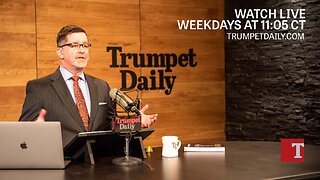 LIVE
LIVE
Trumpet Daily
50 minutes agoTrumpet Daily LIVE | Nov. 10, 2025
405 watching -
 59:08
59:08
VINCE
4 hours agoIs the Shutdown Coming To An End? (Guest Host Hayley Caronia) | Episode 165 - 11/10/25 VINCE
114K148 -
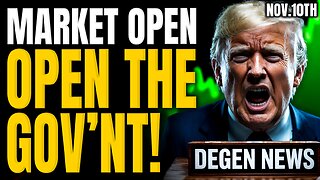 2:15:24
2:15:24
Matt Kohrs
12 hours agoStock Market Squeeze: Gov'nt Shutdown Ends, Stimulus Checks & Breaking News || Live Day Trading
51.8K7 -
 LIVE
LIVE
LFA TV
14 hours agoLIVE & BREAKING NEWS! | MONDAY 11/10/25
4,469 watching -
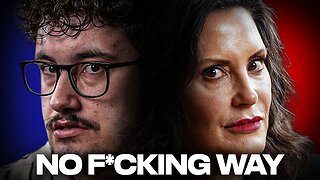 1:14:24
1:14:24
Caleb Hammer
2 hours agoI Confronted The Governor Of Michigan | Financial Audit
12.1K6 -
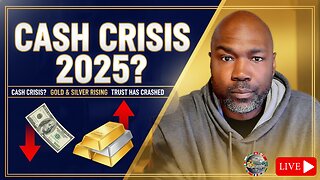 28:45
28:45
Rethinking the Dollar
1 hour agoThey Want You To Stay Broke: 50‑Year Mortgages, Tariffs & Debt Traps
22.4K3 -
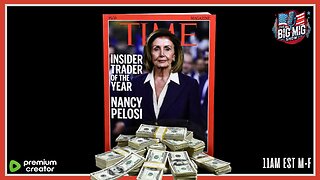
The Big Mig™
4 hours agoInsider Trader Of The Year Award Goes To Nancy Pelosi
16.3K7 -
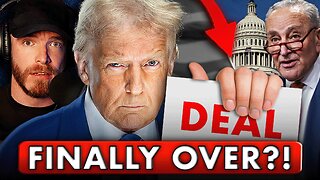 1:03:54
1:03:54
Graham Allen
4 hours agoIs the Shutdown FINALLY ending!?! What was the deal?? + 50 Years Mortgages, $2K checks and More!!
115K82 -
 LIVE
LIVE
Badlands Media
14 hours agoBadlands Daily: November 10, 2025
2,081 watching -
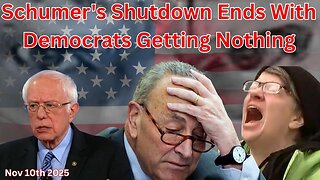 2:55:05
2:55:05
Wendy Bell Radio
7 hours agoSchumer's Shutdown Ends With Democrats Getting Nothing
66K101